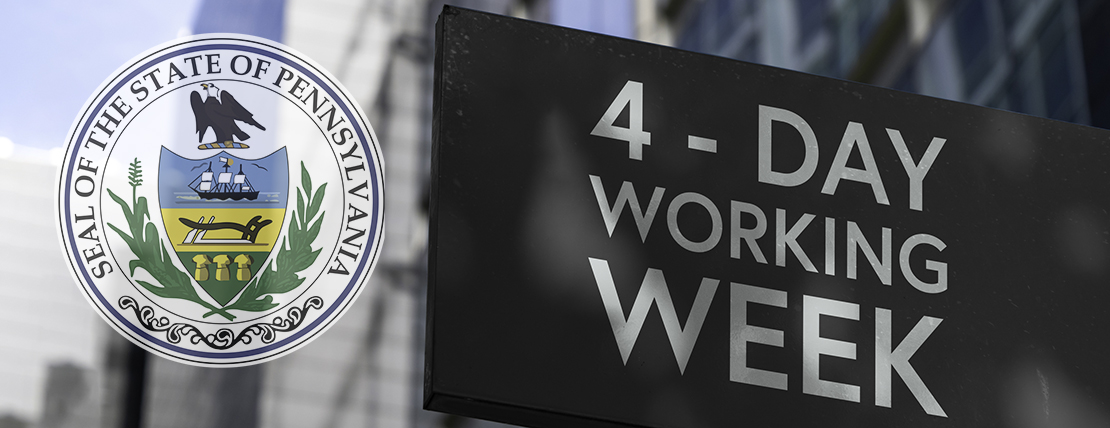- Another push for the four-day workweek. Pennsylvania lawmakers introduced a new bill that would give income tax credit to companies in the state that start a four-day, 32-hour workweek.
- No mandate involved. Pennsylvania’s law could be more effective than previous attempts to implement a four-day workweek at the state level, as it does not involve any mandates for businesses and instead incentivizes them to adopt the new system.
- The changing landscape. More than 90 businesses throughout the U.S. have a four-day, 32-hour workweek. Thousands of U.S. organizations have a compressed workweek, where some or all employees work four 10-hour days.
- Adoption in the UK. A recent UK study found 56 of 61 companies that switched to a four-day, 32-hour workweek without reducing pay wanted to continue testing the four-day week after the study concluded.
Pennsylvania lawmakers recently introduced a new bill that would give an income tax credit to companies that start a four-day, 32-hour workweek.
Currently at least half a dozen states, to varying degrees, are considering legislation to make four-day workweeks more common, according to a CBS News review.
In the U.S., the five-day, 40-hour workweek has been the standard for 85 years. The Fair Labor Standards Act (FLSA), which was passed in 1938, mandated overtime pay for most workers putting in more than 40 hours per week. Before the FLSA, most employees worked a six-day week with few receiving overtime pay for more than 40 hours.
Experts say the reduced workweek is not a one-size-fits-all solution but can offer a win/win for both employers and workers given the right circumstances.
No Mandate Could Be a Positive
One sign of potential victory in Pennsylvania could be in what’s actually missing from the debate, according to Lonnie Golden, professor of economics and labor-employment relations at Penn State University’s Abington campus.
“There’s not a fierce pushback from the Chamber of Commerce or small business advocates,” he said. “They found that in Maryland as well.”
Golden said one of the reasons that the bill is “quite aligned” for passage is because it does not set an onerous mandate for employers.
“[The bill] is simply enticing companies to write off some of their state income tax with a credit if they pass this concept along to a minimum percentage of employees,” he said.
Because the concept of a shortened workweek “interfaces closely” with remote work, Golden said the organizations that embraced remote work during the pandemic would also be the ones most likely to explore the benefits of a shorter workweek, adding that it’s an easier transition for companies in an industry like IT.
“But it also could be something in standard factory plans,” he said, “as long as they take on the additional costs of shift coverage and part-time employees. It’s not infeasible, there’s just a cost to literally shifting over to a four-day workweek.”
Some organizations are already on board, as more than 90 businesses throughout the U.S. have a four-day, 32-hour workweek. Thousands of U.S. organizations have a compressed workweek, where some or all employees work four, 10-hour days.
And recent research is only adding to positive sentiment around the concept.
The Research Is In
One of the most extensive trials of a four-day workweek received overwhelmingly positive feedback.
The study, which concluded in the United Kingdom in February, had 61 companies switch almost 3,000 employees to a four-day, 32-hour workweek without reducing pay.
After the study, 56 of the 61 companies wanted to continue testing the four-day week, while 18 companies were ready to make it a permanent change.
Further, 15% of employees who participated said no amount of money would convince them to go back to working five days per week.
One of the strengths of the study, according to Golden, was in its job diversity.
“The UK study did a good job representing jobs across the board, from hospitals and manufacturers as well as professional services,” he said.
Golden added that forward-thinking companies like the ones in the study should help their workers integrate their work lives with nonwork lives even if the benefits — like higher employee retention and job satisfaction scores — may take longer to realize.
“[The four-day workweek] is a recipe for creating these long-term, better results for employees,” he said, “and more engagement and loyalty to the firm.”
Editor’s Note: Additional Content
For more information and resources related to this article see the pages below, which offer quick access to all WorldatWork content on these topics:








